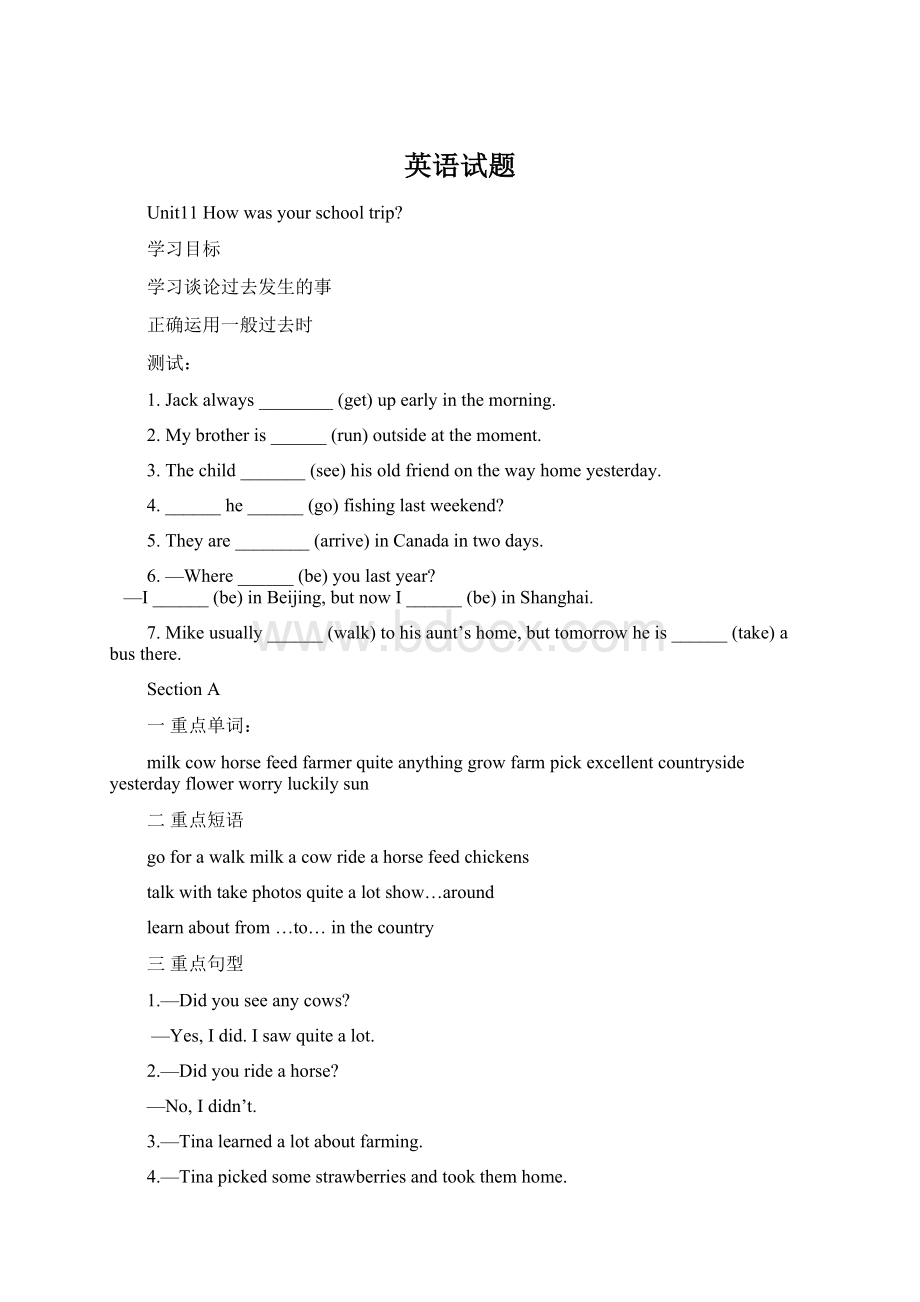英语试题.docx
《英语试题.docx》由会员分享,可在线阅读,更多相关《英语试题.docx(15页珍藏版)》请在冰豆网上搜索。

英语试题
Unit11Howwasyourschooltrip?
学习目标
学习谈论过去发生的事
正确运用一般过去时
测试:
1.Jackalways________(get)upearlyinthemorning.
2.Mybrotheris______(run)outsideatthemoment.
3.Thechild_______(see)hisoldfriendonthewayhomeyesterday.
4.______he______(go)fishinglastweekend?
5.Theyare________(arrive)inCanadaintwodays.
6.—Where______(be)youlastyear?
—I______(be)inBeijing,butnowI______(be)inShanghai.
7.Mikeusually______(walk)tohisaunt’shome,buttomorrowheis______(take)abusthere.
SectionA
一重点单词:
milkcowhorsefeedfarmerquiteanythinggrowfarmpickexcellentcountrysideyesterdayflowerworryluckilysun
二重点短语
goforawalkmilkacowrideahorsefeedchickens
talkwithtakephotosquitealotshow…around
learnaboutfrom…to…inthecountry
三重点句型
1.—Didyouseeanycows?
—Yes,Idid.Isawquitealot.
2.—Didyourideahorse?
—No,Ididn’t.
3.—Tinalearnedalotaboutfarming.
4.—Tinapickedsomestrawberriesandtookthemhome.
5—Howwasyourtriplastweek?
—Itwasexcellent.
6—Theweatherwasgreatandtheairwassoclean.
7.—Itgotverycloudyandweworrieditwouldrain.
四,语言点分析
1.wentforawalk
goforawalk相当于takeawalk.”散步”,后接表示地点的名词时,加介词to,后接副词here,there,home,不接to
eg:
Wecangoforawalk/takeawalk/walktorelaxourselvesafterschooleveryday.
2.AndIfedthechickenswithmygrandpa.我和我的爷爷喂鸡。
1)feed…to…“把。
。
。
喂给。
。
。
吃”Shefedmilktothecow.
2)feedvi.“食,吃”feedon“以。
。
。
为食”Sheepfeedongrass.
3.Isawquitealot.我看见许多(牛)。
quiteadv.相当;完全;十分;很
辨析:
very和quite
1)Very常放在a/an之后
2)Quite可以修饰alot,afew,alittle,abit等喊不定冠词的短语,very不能Ihavequitealittleworktodo.
quite+a/an+形容词+可数名词的单数=a+very+形容词+可数名词单数
(2011)—Wouldyoupleasejoinus?
—I’mnot____.
A.goodaquiteplayerB.quiteagoodplayer
C.aquitegoodplayerD.quitegoodaplayer
4.Didyoulearnanything?
anything不定代词“某事,某物”,主要用于否定句和疑问句中,
拓展:
1)在表示请求,建议或征求意见的疑问句中只能用somethingeg:
Wouldyoulikesomethingtodrink?
2)用作助于时,谓语用单数,相应的代词也用单数(it)
Eg:
Anythingisbetterthannothing,isn’tit?
有点总比什么都没有好,不是吗?
3)修饰anything的形容词应置于其后
Didyouhearanythinginterestingthere?
5.Didyougrowanyapples?
growvt.“种植,栽培”Howquicklythebabyisgrowing.
growup”长大,成长”Whatdoyouwanttobewhenyougrowup?
6.Carollearnedalotaboutfarming.
1)learn学习learn…about…学习,知道,了解
Eg:
I’mlearningEnglishnow.
拓展:
learnabout“了解,知道,获悉相当于knownabout
Eg:
Howdidyoulearn/knownaboutthemeeting.
2)辨析farm,farmer,farming
Farmn.农场,农庄,onthefarm
v.耕种,务农farminSanxi
farmern.农民,农场主Hisuncleisafarmer.
farmingn.,务农,耕种
1.Carolpickedsomestrawberriesandtookthemhome.
1))kvt.才,摘Don’tpickflowersinthepark.
pickupa捡起,拿起某物
b.(用车)来接I’llpickyouupatyourhometomorrow.
2)take…to…把。
。
。
带去。
。
。
9.Itwasexcellent.太好了。
excellent极好的,优秀的相当于verygood.
beexcellentin在。
。
。
方面极好Heisexcellentinmath.
2.Itwassomuchfun.
fun不可数名词“乐趣,开心”“有趣的人或事”,前用great,much,alot等修饰
拓展:
1)havefun“玩得开心”相当于haveagoodtime.
2)funadj.“有趣的。
愉快的”Thisisafunbook.
funny“滑稽的,可笑的”makefunof取笑
3.Luckily,itdidn’t,andthesuncameoutagain.
1)luckilyadv.“幸运地,好运地”,通常放句首,“幸运的是”
拓展luck不可数名词,“幸运”luckyadj。
“幸运的”
Goodluck!
You’relucky.
2)sun“太阳”为世界上独一无二的东西,前必须加the
Themoon,thesky,theearth
3)comeout“出来”out为副词
拓展:
从comeout出版,发表
Thenewtextbookwillcomeoutattheendofthismonth.
4.Howwasyourtrip?
1)How+be+…“…怎么样”=What+be+….+like?
How“怎样,如何”,用于询问方式,程度,状况
Howdoyougotoschool?
2)对于How+be+…?
回答可以是
It’sverygood/great/OK/notbad/verybad/notverygood
3)was是am,is的过去式,“是”
5.takesomephotos.
Take+a+n.表示做一次动作takeashower/rest
takeofftakeawaytakephotostakecaretakeawalk
takeplacetakepartin
6.gofishing.去钓鱼
go+v.-ing去干。
。
。
goswimming/boating/hiking/skating
拓展:
1)goto+名词“去做某事”gotothemoviesgotobed
2)dosome+v.+-ing走某事
Dosomereadingdosomecookingdosomeshopping
14..Luckyyou!
你真幸运!
这是一句非正式口语,相当于You’resolucky.
SectionB
1.重点单词
museumfireexcitinglovelyexpensivecheap
slowfastrobotguidegifteverything
interesteddarkhear
二.重点短语
gofishingatnightcomeout
goonaschooltripalongtheway沿线afterthat之后
buysth.forsb.allinalltakea/thetrain
beinterestedinnot…atallalotof
三.重点句型
1.Whatdidyoudoonyourlastschooltrip?
2.Iwenttothecountryside.
3.Theguidetaughtmehowtomakeamodelrobot.
4.Ithinktoday’sschooltripwasterrible.
5.Theroomswerereallydarkanditwasdifficulttotakephotos.
6.Ididn’tlikethetripatall.
四.语言点分析
1.goonaschooltrip和ontheslowtrain.
1)goonaschooltrip参加学校的郊游,相当于haveatrip
on为介词“在。
。
。
状态中”
onholiday在度假onshow展览onfire着火
goonatripto“到某地去旅行”
goonahike去远足goonapicnic去野餐goonavacation
2)ontheslowtrain.乘慢车
on是介词“在。
。
上”“乘,通过”
IwatchedthenewmovieonTV.
2.Afterthat,Iwenttothegiftshopandboughtsomelovelygiftsformyparents.
1)afterthat后来
2)gift可数名词“礼物,赠品”
3)and连接的两个并列谓语went和bought的时态一致。
4)lovely可爱的Whatalovelygirl.
3.Allinall,itwasanexcitingday.
辨析:
allinall,inall,atall
1)allinall“总的来说”Allinall,wehadagoodtime.
2)Inall“总共,合计”Therearethirtystudentsinall.
3)atall”根本”,用于否定句中,notatall根本不
Hedoesn’tlikeapplesatall.
4..EverythingwasaboutrobotsandI’mnotinterestedinthat.
一切都是关于机器人的,我对那方面不感兴趣。
1)everything不定代词“所有事物,一切”,用于肯定句,疑问句,作主语时,谓语动词用单数
Ihopeeverythinggoeswell.
2)interested“感兴趣的”beinterestedin…”对。
。
。
感兴趣”
I’minterestedinthefilm.
辨析:
interested,interesting,interest
1)interested,adj.“感到有趣的”主语时人
beinterestedinsth。
beinterestedindoing
eg:
IaminterestedinEnglish.
2)interesting,adj。
作表语或定语,主语是物
Thebookisveryinteresting.
3)interestn.“兴趣”
Heknowsmanyplacesofinterests.他知道很多名胜古迹。
(2011)Thestoryis___andallofusare___init.
A.interest,interestingB.interesting,interest
c.interested,interestingD.interesting,interested
5.TherearealsotoomanypeopleandIcouldn’treallyseeorhearguide.
也有太多的人并且我真的不能看到或听到导游。
辨析:
hear和listen
hearvt.“听见”强调听的结果Ilistened,butIheardnothing.
listenvi.“注意听”,强调听得过程Listentome,please.
(2012)Excuseme.Ididn’t___youclearly.Wouldyousayitagain.?
A.HearB.callC.seeD.find
五.语法
一般过去时的用法
知识梳理:
.一般过去时概念
表示过去某个时间发生的动作或存在的状态,常和表示过去的时间状语连用或表示在过去一段时间内,经常性或习惯性的动作。
.一般过去时的结构:
1.Be动词在一般过去时中的变化:
⑴am和is在一般过去时中变为was。
(wasnot=wasn’t)
⑵are在一般过去时中变为were。
(werenot=weren’t)
2.句中没有be动词的一般过去时的句子:
动词过去式规则变化:
1)一般在动词末尾加-ed,如:
pull-pulled,cook-cooked
2)结尾是e加d,如:
taste-tasted
3)末尾只有一个元音字母和一个辅音字母的重读闭音节,应双写末尾的辅音字母,再加-ed,
如:
stop-stopped
4)以“辅音字母+y”结尾的,变y为i,再加-ed,如:
study-studied
动词过去时不规则变化
be
Was/were
keep
kept
set
set
begin
began
know
knew
sing
sang
bring
brought
leave
left
sit
sat
come
came
let
let
sleep
slept
can
could
make
made
speak
spoke
do
did
may
might
stand
stood
fly
flew
meet
met
sweep
swept
get
got
pay
paid
take
took
give
gave
put
put
teach
taught
go
went
read
read
tell
told
have
had
say
said
write
wrote
hear
heard
see
saw
wake
woke
cut-cutput-putspend-spentbuy-bought
.一般过去时的标志:
yesterdayevening,lastweek,yesterday(昨天),lastnight(昨晚),lastweek(上个星期)ago,in2002(在2002年),justnow(刚才),thedaybeforeyesterday(前天)等。
.一般过去时变否定句和一般疑问句:
1)含有be动词的依然在be上做文章.
一般疑问句:
把be动词提前例如:
Hewasastudentlastyear.
疑问句:
Washeastudentlastyear?
肯定回答:
Yes,hewas.
否定回答:
No,hewasnot.
否定句:
在be(was/were)动词后面直接加not
e.g.Iwasbornin1980.Iwasnotbornin1980.Wereyoubornin1980?
2)含有行为动词的
变否定句要在行为动词前加助动词didn't.,同时把动词变成原形;
变一般疑问句,在句首加助动词did,同时把动词变成原形.
变否定句:
把谓语动词部分变成:
didn’t+动词原形
Theywenttohospitalyesterday.
否定句:
Theydidn’tgotohospitalyesterday.
变疑问句:
在句首加助动词did,同时把动词变成原形
Theywenttohospitalyesterday.
疑问句:
Didtheygotohospitalyesterday?
肯定回答:
Yes,theydid.
否定回答:
No,theydidnot.
e.g.Iboughtagiftformymumyesterday.
Ididn'tbuyagiftformymumyesterday.
Didyoubuyagiftforyourmumyesterday?
1.表示现在(指说话人说话时)正在发生的事情。
eg.Wearewaitingforyou.我们正在等你。
2.习惯进行:
表示长期的或重复性的动作,说话时动作未必正在进行。
eg.Mr.Greeniswritinganothernovel.他在写另一部小说。
(说话时并未在写,只处于写作的状态。
)
3.表示渐变,这样的动词有:
get,grow,become,turn,run,go,begin等。
eg.Theleavesareturningred.叶子在变红。
It'sgettingwarmerandwarmer.天越来越热了。
(注:
特殊疑问句=特殊疑问词+一般疑问句)
练习
一.:
用单词适当形式填空。
1.It__________(be)veryhotlastyear.
2.We__________(be)intheNorthin1987.
3.She_________(go)toclasslateyesterdaymorning.
4.LastnightI______(do)myhomeworkand________(have)abath.
5.There_____(be)threebottlesoforangeonthedeskamomentago.
6.Yesterdaymycousin__________(write)alettertome.
7.---Howdidyoulikethebook?
---I__________(like)itverymuch.
8.When______you________(have)breakfastyesterday?
9..I___________(notsee)youyesterday.
10.Where(do)yougojustnow?
11.WhenIwasachild,Ioften(play)footballinthestreet.6
12.What(do)you(do)lastweekend?
二.选择填空
( )1.Lee________hismobilephoneathome.
A.wasleft B.hasleft C.hadleft D.left
( )3._____he________agoodrest?
No,hedidn’t.
A.Have,had B.Did,have C.Did,had D.Had,had
( )5.Mr.Blackwaslatebecausehe_______hisway.
A.losted B.hadlost C.haslost D.lost
( )7.When_________Lee________schoolthismorning?
A.had,gotto B.did,getto C.did,get D.did,gotto
( )8.Willyoupleasesayitagain?
I________quite_______you.
A.didn’t,hear B.haven’t,heard